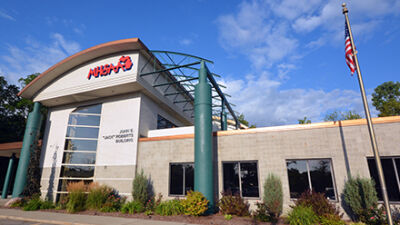METRO DETROIT — There’s a dwindling pool of substitute teachers, a crisis officials say is compounded by a serious lack of public and private educators nationwide.
With the first day of school approaching in Michigan — and some already underway — districts are feverishly recruiting substitutes to have on hand when classroom teachers get sick, go on maternity leave or are otherwise unable to work.
The need for subs is rising, experts say, because of the teacher shortage, which is causing stress on the number of subs. The burden has fallen equally on public and parochial schools, including in the Archdiocese of Detroit.
“I believe it’s just that trickle-down effect from Michigan having so many openings for teachers that the next flow of who would be available have already tapped in for teaching positions,” said Eric Haley, the associate superintendent for the north and south regions of the archdiocese’s Department of Catholic Schools. “I think the greatest challenge for us is within the city of Detroit and the suburbs around it, but it is apparent in other places as well.”
Schools have been working diligently over the summer to build what Haley calls a healthy “bench of subs” — including retired teachers, before- and after-school caregivers, and others.
“Having a bench is so important, because you never know what’s gonna happen. You could get hit with a year, say you’re a small school, K-8, and of your nine teaching positions, two or three go out on maternity leave or medical leave or something, and your normal pool of subs is gobbled up pretty quickly,” he said. “So even those that feel like they are in a good position, it’s always a wise idea to have a deeper bench of options.”
Avondale Schools is experiencing their greatest need in special education, both for teachers and substitutes.
“With special education substitutes, (The Michigan Department of Education) requires a bachelor’s degree for those types of substitutes, and there is a teacher shortage in that area, so it makes it even more challenging,” said Sharon Hyde, the executive director of human resources for Avondale Schools.
“And we don’t see much changing on the horizon, because the universities are all turning out far fewer candidates in special education than they have in many, many years, so we don’t see that pool of candidates getting replenished in the near future,” added Avondale Superintendent James Schwarz.
To lessen the burden, Avondale Schools uses Edustaff, a substitute staffing service in Grand Rapids, to provide substitute services for the district’s teachers and paraprofessionals. The district also designates two substitute teachers to each building in the district.
“The substitutes are assigned to that building, and they report to that building every day to be used on an emergency basis, and we’ve increased that pay rate to $150 per day for our building substitutes,” said Hyde.
This year, Avondale has also used some creative planning to add bulk to its sub list.
“Our paraprofessionals who have 60 credits or more, I have applied for the daily substitute permit for them, so that we can use them in case of an emergency,” Hyde explained. “That has been very helpful.”
Like Avondale, others within the education system have had to think outside the box to draw substitutes amid the shortage.
“In terms of recruitment, we have done the career fairs, we’ve talked to recruiters, and we’ve looked at trying to help people get into alternative certification programs — those are the big things. For us, a big one has been people who retire out of public schools and maybe they want to collect their public school retirement and work in a private, non-public Catholic school,” Haley said.
To become a substitute in Michigan, one must meet certain qualifications. All substitute teacher permits offered through the MDE require at least 60 semester hours — earning a grade of C or better — in any subject area from one or more two- or four-year colleges or universities. However, there are restrictions on the number of days someone can work, based on the permit.
The MDE’s Daily Substitute Permit allows people to complete intermittent daily substitute assignments of up to 90 calendar days within a school year, unless they seek a formal extension, while the Full-Year Basic Substitute Permit allows someone to work the same teaching assignment for more than 90 days, up to a full school year. For people hoping to teach a core subject area, the Full-Year Basic Substitute Permit also requires one to have a related degree or a passing score on a state-approved test in the area.
The Full-Year Shortage Substitute Permit — which requires a Michigan Professional, Advanced Professional Teaching Certificate — allows someone to teach a core subject area if they also have a relevant degree or passed a state-approved test in the specialty for up to half full-time equivalent per teacher.
The Full-Year Expert Substitute Permit requires a demonstrated ability in the subject the substitute teacher instructs, and in most cases, at least five years of work experience in the subject for up to half FTE per teacher. Education requirements vary based on the subject being taught.
Schwarz said Avondale is more confident in starting the school year with its current level of substitute teachers — although he said the district can always use more — compared to its certified special education staff.
“That’s where we’re really struggling,” he said. “The experience credit from district to district varies depending on their agreed-upon teacher contract, so you have some teacher contracts in some districts that are fairly liberal and allow for a lot of experience to be counted when granting a position, so they get a higher salary. You have other districts, such as Avondale, where there are caps on experience, where no matter how many years in the industry you may have, you’re capped at a certain level coming in. … That creates a discrepancy between districts in hiring. It’s particularly problematic when you have a shortage of a pool of candidates, like what we have now, particularly in special education, foreign language, technical course work and things of that nature.”
For more information about substitute teacher permits, contact the Michigan Department of Education at (517) 373-3310 or the school district you want to apply to directly.
 Publication select ▼
Publication select ▼





























